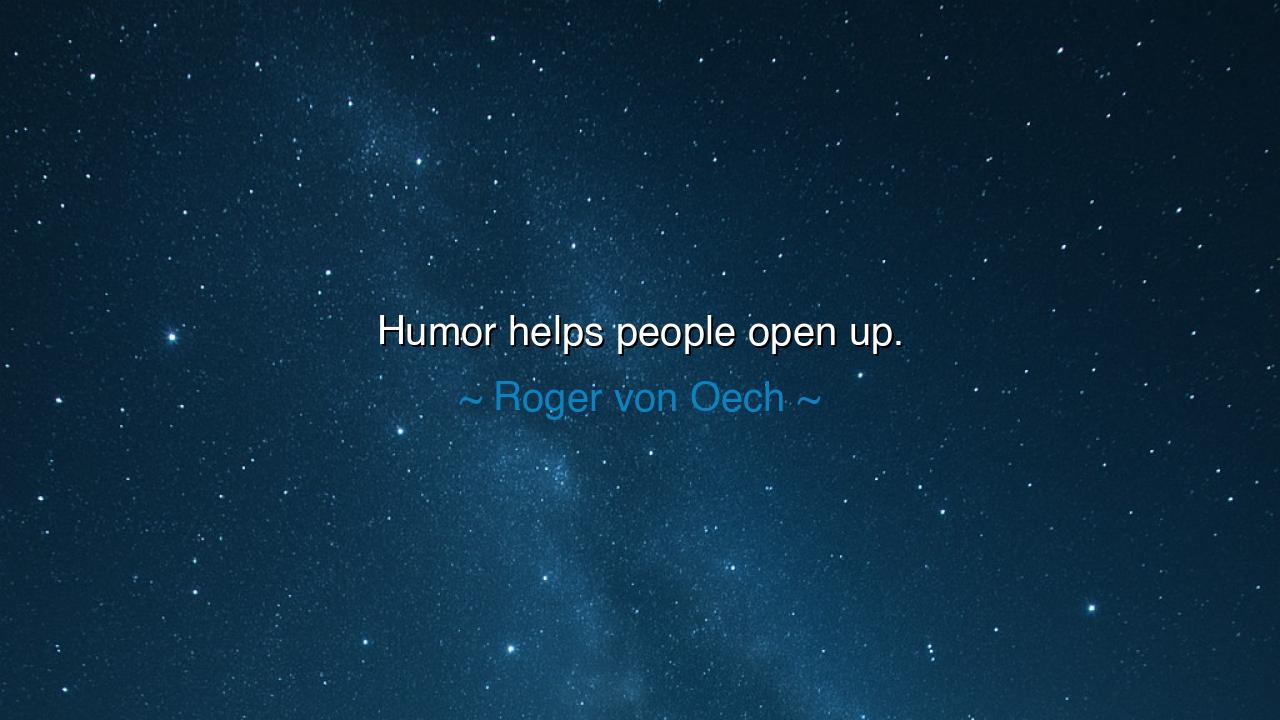
Humor helps people open up.






When Roger von Oech declared, “Humor helps people open up,” he revealed a truth as ancient as civilization itself: that laughter is the key to the human heart. His words may sound simple, but within them lies a wisdom profound and timeless. For humor is not merely the art of jest—it is the alchemy of connection, the sacred force that dissolves fear, pride, and defensiveness, and allows souls to meet in their most human form. Von Oech, a philosopher of creativity, understood that before people can think freely, before they can dream or invent or heal, they must first open up—and laughter, that most mysterious of human expressions, has the power to unlock the spirit when logic or persuasion cannot.
The origin of this insight springs from von Oech’s work in creativity and innovation. A thinker devoted to freeing minds from the prison of convention, he saw that true invention required vulnerability—the courage to let go of certainty and to play. But vulnerability is difficult; the mind guards itself with seriousness, the ego hides behind solemnity. Thus, von Oech discovered that humor is the great disarmer. When people laugh, their walls fall away. The critic within them softens. The intellect yields to imagination. In that moment of joy, fear loses its grip, and new ideas—new connections—are born. To laugh together is to trust, and in trust lies the beginning of all creation.
Humor, in its highest form, is not cruelty or mockery—it is the gentle wisdom of perspective. It reminds us that life, with all its chaos and tragedy, is still a dance of wonder. The ancients knew this. In the courts of kings, the jester was not merely a clown, but a truth-teller. He was the only one who could speak freely to power, for his humor turned rebuke into revelation. The laughter he evoked was not trivial; it was the laughter that heals pride and exposes folly. It allowed kings to hear what no counselor dared say, because laughter, unlike accusation, does not wound the ego—it slips past it. Thus, in humor lies both freedom and truth, for it opens the mind not by force, but by delight.
Consider the story of Abraham Lincoln, a man burdened by the sorrows of a nation at war. He was known to use humor even in the darkest hours, not to escape the weight of his duty, but to bear it. Once, when accused of being two-faced, Lincoln smiled and said, “If I were two-faced, would I be wearing this one?” That simple jest transformed tension into laughter. It disarmed critics and reminded his people that even in crisis, humility and lightness were signs of strength. Lincoln understood what von Oech later taught: humor is the bridge between hearts, the power that opens dialogue where bitterness might have built walls.
Humor also possesses a divine paradox—it humbles and elevates at once. It teaches us to laugh at ourselves, stripping away the illusion of perfection, and in that very act, it uplifts us into authenticity. The person who can laugh at his own mistakes has already begun to master them. The one who can find humor in hardship has found the seed of resilience. Von Oech’s insight reaches beyond creativity and into the soul: for what is it to “open up,” if not to be seen as we truly are—fragile, foolish, yet capable of beauty? In laughter, we remember that we are not gods pretending to be flawless, but humans learning to be kind.
The power of humor is not confined to art or politics; it is the secret of all human relationships. In the home, laughter mends what anger breaks. In friendship, it binds more deeply than solemn promises. In love, it keeps the heart light enough to endure the weight of life. When two people laugh together, the distance between them vanishes; they share a single rhythm, a single breath of joy. It is no wonder that von Oech, a man devoted to freeing the creative mind, saw humor as essential to communication. For when people laugh, they stop defending their identities and begin to reveal their souls.
Thus, my children of thought and feeling, take this lesson to heart: use humor as a key, not as a weapon. Let it unlock hearts, not close them. When you seek to teach, begin with laughter; when you wish to heal, bring joy before instruction. Do not fear being light-hearted—for even the gods, the ancients said, delight in play. If you would open another’s mind, do not strike it with argument—tickle it with wonder. And if you would open your own, learn first to laugh at your fears.
For in the end, Roger von Oech’s wisdom is not about comedy—it is about courage. To laugh is to trust life, even when it breaks your heart. To make others laugh is to offer them freedom, if only for a moment. So go forth, armed not with solemnity, but with the sacred gift of humor. Use it wisely, and you will find that doors once locked by pride and pain will open—silently, joyfully—to the music of laughter.






AAdministratorAdministrator
Welcome, honored guests. Please leave a comment, we will respond soon